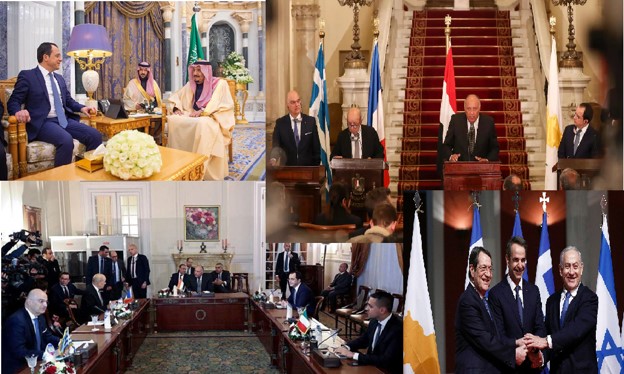Nordic Monitor
An anti-Erdoğan alliance is intensifying its diplomatic initiatives to counteract Turkish President Recep Tayyip Erdoğan’s moves in the Mediterranean, organizing a regional summit, signing an interstate energy agreement and conducting bilateral visits.
President Erdoğan with the support of ultranationalist coalition partners the Nationalist Movement Party (MHP) and the Motherland Party (VP) is pursuing an aggressive foreign policy that has isolated Turkey in its region and beyond, triggering anti-Turkey alliances in the Mediterranean and the Middle East.
The foreign ministers of Egypt, France, Cyprus and Greece issued a final communiqué following a meeting in the Egyptian capital of Cairo on January 8, 2020. Italian Foreign Minister Luigi Di Maio was also present at the meeting as an observer. The foreign ministers discussed the latest regional developments and the situation in the eastern Mediterranean and agreed to denounce deals signed between Turkey and the Libyan Government of National Accord (GNA).
In November 2019 the GNA and Ankara signed two key accords: one on security and military cooperation, and another on maritime boundaries in the eastern Mediterranean.
The declaration underlined that the Turkey-GNA agreements “have further undermined regional stability, and are both considered null and void,” adding that “the Turkey-Libya Memorandum of Understanding purporting to delimit maritime jurisdictions in the Mediterranean Sea infringes upon the sovereign rights of third States, does not comply with the Law of the Sea and cannot produce any legal consequences.”
“The Ministers deemed the security memorandum and any decision to send troops to Libya to be a serious violation of the United Nations Security Council resolution 2259 and other relevant United Nations Security Council resolutions, and a threat to regional security and stability, and called for an immediate de-escalation,” the communiqué says.
The following day, the Turkish Foreign Ministry issued a statement in which it said the declaration made in Cairo was “based entirely on factitious arguments and false premises.”

Turkey’s diplomatic and military efforts to control the eastern Mediterranean evoked a strong reaction in Europe and accelerated the signing of the EastMed pipeline project. On the second day of the new year, Israel, Greece and Cyprus signed an agreement for the EastMed project to ship gas from the eastern Mediterranean to Europe. During the signing ceremony on January 2, 2020, Israeli Prime Minister Benjamin Netanyahu invited other countries, especially Italy and Egypt, to join the project, emphasizing that the EastMed will help stabilize the wider region.
The European Commission praised the EastMed gas pipeline deal as a welcome development for strengthening energy security. “The EastMed pipeline is one option to bring that gas to the continent,” an EU spokesperson stated.
The EastMed pipeline includes 1,300-kilometer offshore and 600-kilometer onshore pipeline sections and will transport natural gas from Israel to Greece and Italy. The cost to lay the pipe from the eastern Mediterranean to Italy is estimated to be 6 billion euros.

In addition to littoral states, the anti-Erdoğan alliances have also spread to the Middle East. The recent visit of Cypriot Foreign Minister Nikos Christodoulides to Saudi Arabia revealed the kingdom’s willingness to join the club.
Christodoulides was received by King Salman bin Abdulaziz Al Saud on January 19, 2020. During the meeting they discussed ways of enhancing bilateral relations between the two countries and regional and international issues of common interest, the Saudi Press Agency reported.
Christodoulides also met with his Saudi counterpart, Prince Faisal bin Farhan bin Abdullah, in Riyadh. According to the Arab News, Prince Faisal stressed the depth of relations between the two countries and the keenness to develop them in several fields to serve their common interests. “The Kingdom is following with great interest the current developments in the Eastern Mediterranean region, is showing its concern for security and stability there, and stresses its full support for the sovereignty of Cyprus over its territories,” Prince Faisal was quoted as saying.

In September 2019 Ibrahim bin Abdulaziz Al–Assaf, the then-foreign minister of Saudi Arabia, paid a historic visit to Cyprus, the first-ever in the history of diplomatic relations between the two countries. The symbolic visit came one week after the official appointment of the first Saudi ambassador resident in Nicosia.
Turkish ties with the most of the Gulf monarchies have suffered because of President Erdoğan’s support for the Muslim Brotherhood and the Turkish government’s efforts to undermine the anti-Qatar bloc led by Saudi Arabia and Egypt. Similarly, Erdoğan’s “neo-Ottoman” aspirations and radical Islamist policies to shape the region have come to a halt, and Turkey today is more isolated in the Middle East, the Mediterranean and North Africa, with the exception of a few small countries.

In Libya’s nine-year civil war, Turkey has supported the UN-recognized GNA in Tripoli, headed by Fayez al-Sarraj, against the Libyan National Army, led by eastern military commander Khalifa Haftar.
The Turkey-Libya maritime and security cooperation agreements were signed in Istanbul on November 27, 2019 during the visit of al-Sarraj. In accordance with the maritime deal determining the Turkey-Libya continental shelf, Turkish drill ships are conducting exploratory activities off the coast of Cyprus. Moreover, Turkey’s parliament authorized the Turkish government on January 2, 2020 to deploy military forces in Libya in with the security accord. In addition to military troops that Erdogan claimed were to serve in a coordination and advisory capacity only, Turkey transferred 1,200 Syrian jihadists to fight for the GNA.












